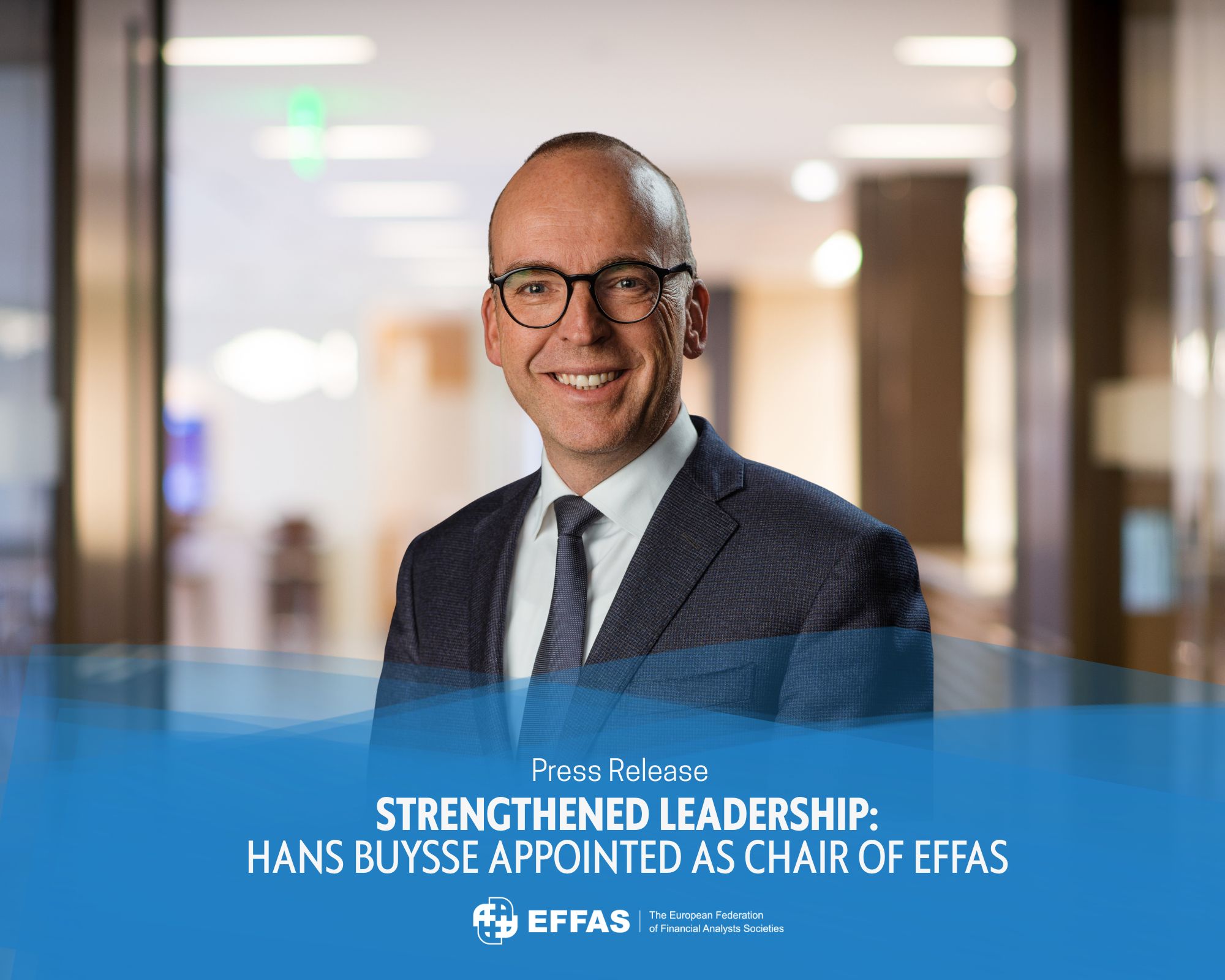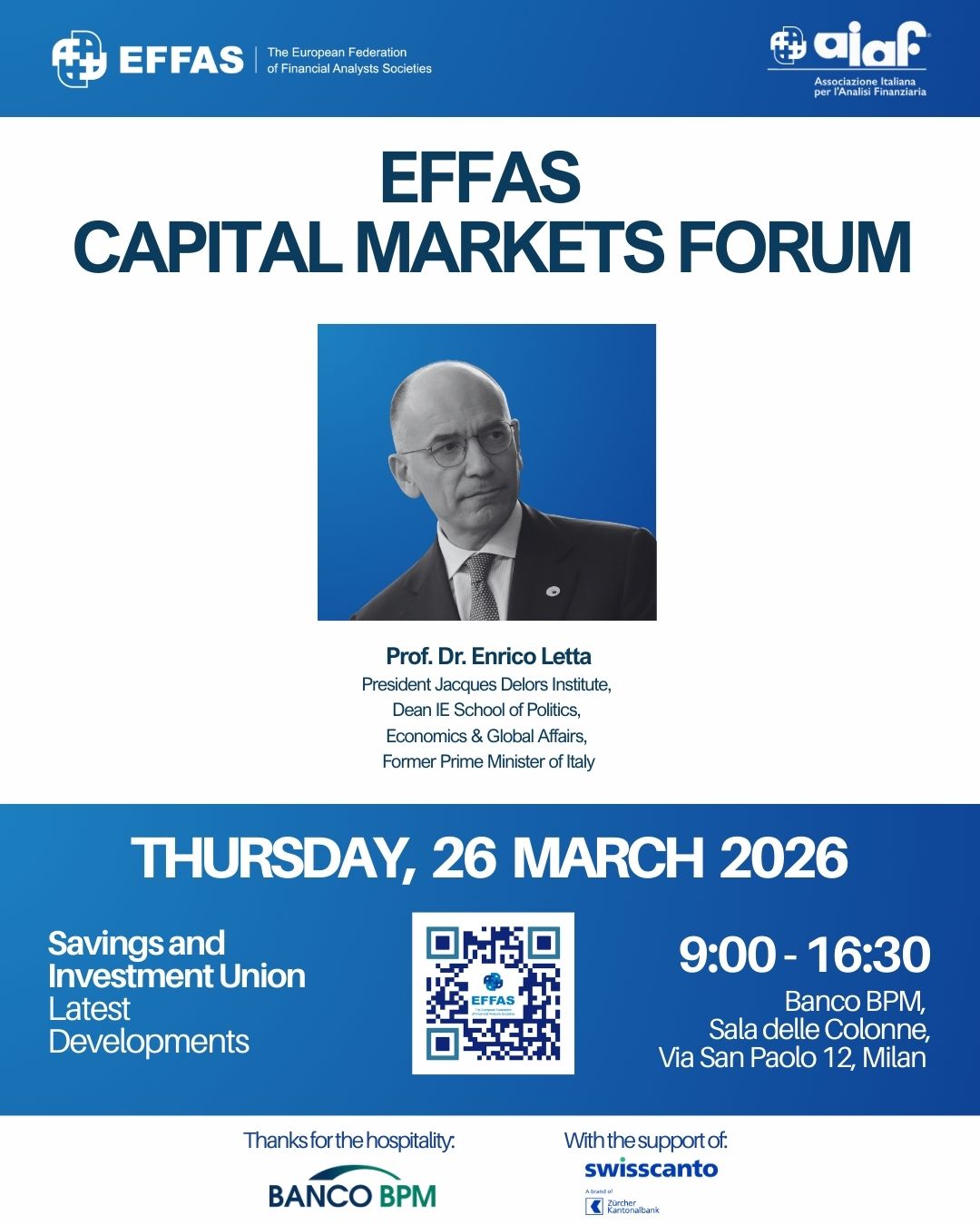EFFAS requests clear measures for developing European capital markets union
- stop tax discrimination of equity
- review of Solvency II requested
- SME markets need paramount attention
- no more unrealistic off-market regulation like the ban of free Research (MiFID II)
The European Federation of Financial Analysts Societies (EFFAS) on behalf of Dr. Jesus Lopez Zaballos, Chair of EFFAS, and Dr. Manuel Puerta Da Costa, Chair of the Portuguese Association of Financial Analysts (APAF), invited their members to a two day summit in Lisbon to discuss the topic of stretching capital markets for growth.
Fritz Mostböck, Chair of the Austrian Association of financial Analysts (ÖVFA), Deputy Chair of EFFAS and Head of Group Research at Erste Group, opened the summit. He explained why based on a sluggish macroeconomic growth outlook for Europe a multi-crisis environment continues to promote ESG as a result of megatrends. More than 80 financial analysts participated in the lively debates about how to develop the European Capital Markets Union. They were made up of high level representatives from the Portuguese National Bank, ESMA, EFRAG, the Portuguese Securities Market Commission, the asset management industry and selected guests from EFFAS member societies.
Public budgets across Europe are already under pressure and we cannot risk overstretching them. Therefore, it is important to have a closer look at European Capital Markets. Very few European IPOs, ever declining numbers of listings and an extremely low market cap to GDP ratio describe our structural deficits in public equity markets says Thorsten Müller, chair of the German Association of Financial Analysts (DVFA), board member of EFFAS and Managing Partner at Lighthouse Corporate Finance GmbH in Frankfurt.
Public equity markets are of strategic importance for Europe. They secure an efficient capital allocation and enable corporates to strengthen their balance sheets via capital increases. Strong balance sheets make companies more resilient against economic stress. And finally, equity is the basis for economic growth, innovation and job creation. Historically debt funding has always been promoted in Europe. However, times have changed. To fund the transition to a carbon neutral economy equity will be key for developing Europe’s future. Without an improved architecture for equity markets in Europe the successful transition to a net zero European economy might be at risk, concluded Thorsten Müller. There are several other aspects which were addressed during the conference:
Tax discrimination of equity
The tax deductibility of debt discriminates equity against debt funding. This has to be changed. Dr. Norbert Kuhn, deputy head of capital markets at Deutsches Aktieninstitut described the concept to exempt capital gains and dividend payments for long-term investments (holding period > 5 years) from withholding tax. He recommends including this concept in long-term equity savings accounts.
Review of Solvency II
Dr. Carsten Zielke member of the Capital Markets Commission of EFFAS and owner of Zielke Research Consult GmbH, clearly pointed out that Solvency II overregulates insurers and makes public equity investments less attractive for the insurance industry. While participations (which very often are private equity) have a capital charge of 22% public equity has a substantially higher capital charge of 35%. He sees this as being economically inconsistent. Transparency and liquidity of a listed stock is a burden for investors rather than an added value vs. private equity. The current regulation is too focused on short termism, namely volatility and not on long-term returns. There is an urgent need to review Solvency II and to reform IFRS 17, an important accounting rule.
SMEs need paramount attention
While companies with a market cap of more than €5bn enjoy international investment flows including ETF investments, companies between €1bn and €5bn market cap are more in the focus of national investors. But both segments are sufficiently liquid for investors. However, when it comes to companies with a market cap of less than €1bn market cap the picture differs substantially. Some 85% of all listed companies in Europe are companies with a market cap of less than €1bn market cap. But they just account for less than 10% of Europe’s overall market cap. These companies often face substantial difficulties in acquiring capital market funding. Accordingly special emphasis at the conference was dedicated to national best practice cases for SMEs, which could serve as a role model for Europe:
- As SMEs are often innovative, creating growth and jobs, there is a strong need to incentivize investors to invest funds into SMEs. Davide Grignani, Chair of the Italian Financial Analyst Association (AIAF), presented the Italian PIR programme as a best practice case for Europe. The PIR programme has been also designed to increase investments in listed SMEs. The programme combines long-term investments, tax incentives and minimum investment quotas for SMEs. Via the PIR programme Italy managed to acquire a substantial cash inflow for Italian SMEs.
- Later on, the Swedish nano and micro cap segments run by Spotlight group were introduced to the audience showing that even companies with a market cap as small as €1m can be successfully listed in Sweden. Markus Neuding, Executive Vice President of Spotlight Group in Sweden, pointed out, that a fully loaded ecosystem as a one stop shop approach including tax incentives for nanocaps has been instrumental in the Swedish success.
No more unrealistic off-market regulation like MiFID2, which hinders the competitiveness of EU-wide listed companies
During the conference, it was announced that the UK intends to lift the MiFID2 ban on free research for clients. Unbelievably, MiFID2 was introduced under the pretext of a necessary “unbundling” process under the auspices of a British EU commissioner. We as EFFAS think that the EU has to react decisively in order not to suffer significant competitive disadvantages for EU financial markets, which will then also lead to job losses at listed companies and location disadvantages.
- MiFID II regulation has substantially reduced the research coverage of SMEs across Europe. Orphan stocks are a consequence – companies with no research coverage at all. Alfredo Echevarria presented the “Spanish solution” to the orphan stock problem. Lighthouse is a fundamental analysis project of the Spanish association of financial analysts and BME (owner of the Spanish stock exchange; SIX Group). Lighthouse does not charge for the research coverage. BME is funding the research, ensuring independent research and just passes a small portion of the cost to the researched company to ensure its commitment. Lighthouse has previously won an SME Prize from the European Commission.
Dr. Jesus Lopez Zaballos, EFFAS Chairman, strongly supports the idea that SME best practice cases should be continuously discussed on a European level to foster SME investments. He promised that EFFAS will come up with a European concept for SMEs later this year.
The conference also covered ESG reporting topics. Mr. Tom Dodd, Team Leader of Sustainability Reporting, at the European Commission introduced the audience to the main points of the delegated draft on European Sustainability Reporting Standards (ESRS). Hans Buysse, president of the Administrative Board of EFRAG, chair of the Belgian Association of Financial Analysts (ABAF) and member of the Board of EFFAS, pointed out that EFRAG and ISSB will continue a fruitful dialogue to save companies from double ESG reporting.
Asset management industry panelists stressed that revenues had doubled in the last 15 years, but most of the increase was driven by market performance. They added that fees from new inflows have been erased by additional regulative requirements. For the future a fee compression is expected due to lower anticipated market returns combined with increasing regulation and competition.
While the conference was taking place the UK government announced that it intended to lift the MiFID II ban on free research for clients. MiFID II was introduced under the pretext of a necessary “unbundling” process under the auspices of a British EU commissioner. We at EFFAS think that the EU has to react decisively in order for EU financial markets to not suffer significant competitive disadvantages, which could then also lead to job losses at listed companies and locational disadvantages according to Fritz Mostböck.
Dr. Manuel Puerta da Costa, conference host, Chairman of the Portuguese Association of Financial Analysts (APAF) and member of the Board of EFFAS, rounded off the conference by concluding that its success should be repeated next year when APAF celebrates its 40th anniversary. He would be more than happy to host the next EFFAS Summer School again in Lisbon.







